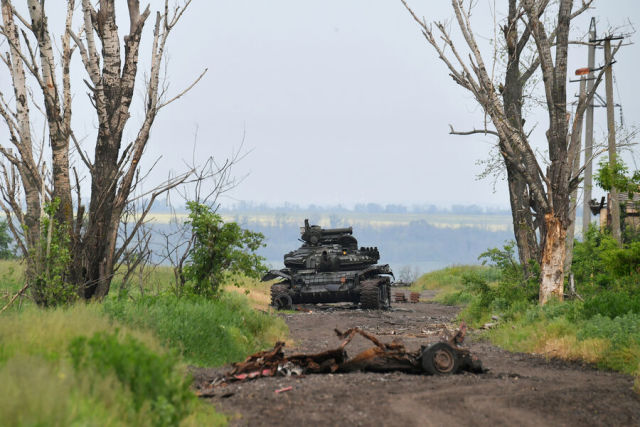Colonel Khodarenok believes that Kiev's failures dispel the myth of the military might of the NATO bloc
NATO told about the problems of the Ukrainian counteroffensive due to the terrain and the resistance of the Russian Federation. Journalists of the German edition of Bild state that "it is becoming increasingly difficult to fight with the Russians." The reasons and consequences of the failures of the Ukrainian counteroffensive were investigated by the military observer of the newspaper.En" Mikhail Khodarenok.
Journalists of the German newspaper Bild write that the counteroffensive of the Armed Forces of Ukraine (AFU) continues to be hampered by Russian air superiority, as well as successful counterattacks of the Armed Forces of the Russian Federation. "It's getting harder to fight the Russians!" reads the headline of the article.
And the day before, answering a question from Politico journalists about Ukraine's counteroffensive, NATO Secretary General Jens Stoltenberg acknowledged the serious problems that the Armed Forces of Ukraine face on the battlefield.
Let's begin to analyze the statement of the head of NATO on points.
The first is that Ukrainians "face difficult terrain." Recall that the planning of any offensive operation begins with an assessment of the situation, which includes an assessment of the enemy, its troops, the area of operation (combat operations), terrain, as well as other factors affecting the performance of the task.
In fact, it turns out that the APU underestimated the terrain. It sounds amazing to say the least. One could still somehow agree with such an opinion if the Armed Forces of Ukraine, for example, landed in Normandy in 1944 and unexpectedly encountered orchards, plots of plowed land in the Saint-Lo area, each of which was bordered by dense live (and prickly, by the way) hedges, some of which reached a height of five meters. In fact, it was a natural system of fortifications that was well adapted for defense. For Ukrainians, the Normandy area, quite possibly, would be filled with all sorts of surprises and surprises. And that would not be surprising.
But the APU is fighting in a territory where they know every bush, every ravine and every path. How, at the same time, Ukrainian fighters could unexpectedly encounter difficult terrain is a big question.
Now about the "entrenched resistance of Russia." If we translate Jens Stoltenberg's phrase "entrenched resistance" into military language, then it will sound something like this - Ukrainians are faced with engineering structures erected by Russian troops on the ground for firing, concealed maneuver with firepower, protection of personnel and military equipment from modern means of destruction.
Only one thing is unclear - the enemy (that is, the AFU) had the opportunity for nine months to observe the construction by the Russian army of defensive lines, positions, areas of location and deployment of troops, firing positions of missile troops and artillery, starting positions of anti-aircraft missile troops, military rear facilities. The creation of a system of trenches and communication passages during the fortification equipment of the terrain is generally very difficult to hide from any means of reconnaissance.
That is, the Armed Forces of Ukraine had every opportunity to open the system of engineering barriers of the Russian army, and to establish the location of platoon, company strongpoints, battalion defense areas and regimental defense sites, as well as to identify areas of the location of control points of the Armed Forces of the Russian Federation.
Moreover, before the start of the Ukrainian "counteroffensive", there was a lot of talk that the United States and its NATO allies were fully supplying the Armed Forces with intelligence information. If everything turned out unexpectedly, then it turns out that they did not supply?
Thus, it is possible to formulate a third question in this regard - do the leaders of NATO, represented by the Secretary General of the North Atlantic Alliance Jens Stoltenberg, realize that they dispel the myth of the military power of the NATO bloc to a certain extent with such statements?
Again, in fact, it turns out exactly this way - the Ukrainian "counteroffensive" was prepared-prepared in the West, supplied with weapons, equipment, and material means, and the overall result at this stage has turned out to be extremely unconvincing. It seems that the preparation of the Armed Forces of Ukraine for subsequent offensive operations should be started almost anew.
The opinion of the author may not coincide with the position of the editorial board.
Biography of the author:
Mikhail Mikhailovich Khodarenok is a military columnist for the newspaper.Ru", retired colonel.
He graduated from the Minsk Higher Engineering Anti-Aircraft Missile School (1976), the Military Air Defense Command Academy (1986).
Commander of the S-75 anti-aircraft missile division (1980-1983).
Deputy Commander of the anti-aircraft missile regiment (1986-1988).
Senior Officer of the General Staff of the Air Defense Forces (1988-1992).
Officer of the Main Operational Directorate of the General Staff (1992-2000).
Graduated from the Military Academy of the General Staff of the Armed Forces of Russia (1998).
Columnist of "Nezavisimaya Gazeta" (2000-2003), editor-in-chief of the newspaper "Military-Industrial Courier" (2010-2015).
Mikhail Khodarenok

